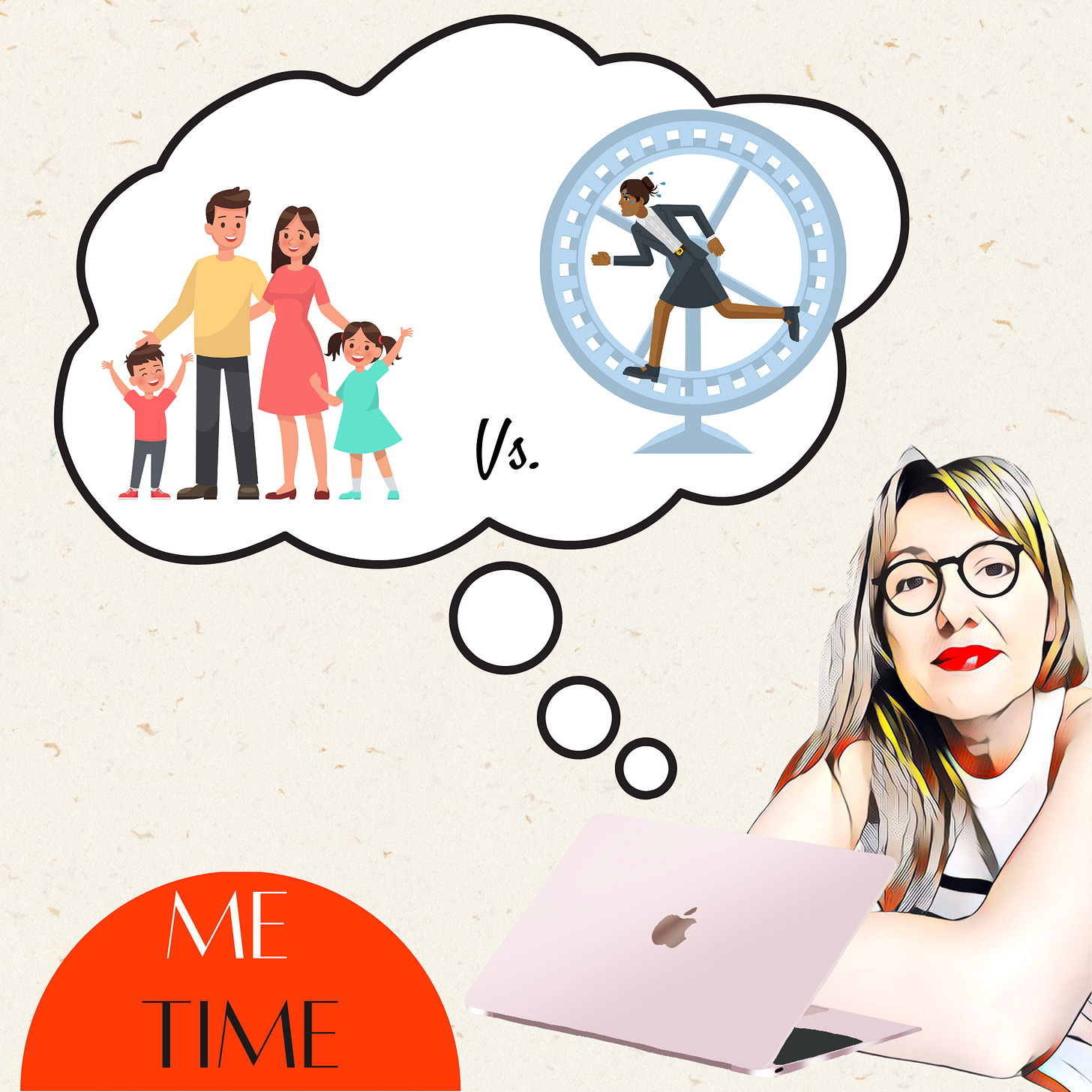Step 1. Roadmap Out of Burnout (START HERE!)
Across industries, geographies and the gender divide, there is an epidemic that is affecting the workplace and world! Studies after studies show alarming stats: 50-60% of workers are burning out!
What we’ll cover today:
1. Letter from the heart
Hi Me Timers!
I hope you’re having a joyful week! Today is an important day for this newsletter.
As Simon Sinek says: “Start with WHY!” and go from there.
I always say “ME TIME” saved my life. And I truly believe it. “Me Time” can save you too because Me Time means you taking back control of your life, writing your own story, taking your power back! For me the change started with burnout.
Because burnout was so scary for me, for my family and for friends. It was so confusing to go though also…I did not know how to get back to health. Now, I’ve decided: It is time to pay it forward.
I want to open up about my journey out of burnout and hopefully, in the process, help someone else that’s still trying to find their way out. One letter was not enough though. So, for the next few newsletters, we’ll be unpacking burnout and, more importantly, the practical path back to health.
This newsletter series could be the backbone to a free program I am thinking to create (IF THERE IS INTEREST). The goal is to provide what worked for me (and others) to get back to health and to find joy again.
P.S. If you are interested in having a full burnout recovery program, sign up to show your interest.
P.P.S. Leave a comment if you want to hear the whole story of how I figured out I was burnt and what I did first.
2. Google’s recent 60 hour work-week scandal
Well burnout is complicated and we cannot entirely blame it on work BUT… we all know work is demanding more and more of our energy. And I do not use “demand” lightly.
STORY TIME: Things are getting real Googly up in here!
On Feb 24th, the New York Times broke the news of an internal memo from Sergey Brin, one of Google’s founders. Brin said that employees working on AI should come into work “at least every weekday” and that each should put in what he calls a “60 hour work-week” to “win the AGI race”.
He calls those working under 60 hours “...highly demoralizing to everyone else.”
I hate math. But I did a bit of time-math for us to really understand the cost of 60 hours a week:
One human week has 24 hours x 7 days = 168 hours in a week
Sleep on average takes 7 hours (ideally)
168 - (7x7) = 168- 49= 119 hours left after we remove sleep
Commute takes 1-2 hours a day… let’s average that to 1,5.
119- (1.5x5) = 119- 7,5 = 111,5 (removing time for commute x5 days)
111,5 - 60 hours work = 51,5 (=Personal Time)
Weekends (minus sleep time) have 34 awake hours.
So work-week free time is
51,5-34 = 17,5 A GRAND TOTAL of 17,5 hours over the 5 working days.
That’s an average of 3,5 hours a day in which we should fit:
Getting yourself and kid(s) ready, dogs walked, cats fed, garbage out, Kid delivery and pickup, making breakfast and dinner, packing lunch, helping with homework, bath and bedtime, workout? self-care? rest?
THE MATH ON TIME SUDDENLY DOESN’T MATH , DOES IT?
Now you know what I mean about things getting Googly up in here! Below is a real picture of my brain thinking of a 60 hour workweek.
The thing is…. money/jobs come and go. But TIME…TIME is the only commodity that’s irreversibly finite for people. So it pisses me off when companies DEMAND it.
And we freely and generously give Time including more of our “Me Time” to our work! For what? For companies to fulfil their KPIs/OKRs?! In the process, we are totally forgetting about ourselves.
We set aside our family commitments, our dreams, our hobbies, our wanderlust, and we go hard on the goals of the company with the hopes to:
maybe be seen
be appreciated
get the promotion everyone else is gunning for…
and have the salary that gives us the status and stability that we crave.
But we all forget about the TIME cost of everything we do, including work. Once spent, you cannot get time back! What’s even worse?
2.1 The Real Cost of Work
Missing your kids’ childhood can be the real cost of work. You will never get the chance again.
F-ing up your health is the real cost. You may never get back to health again! You may get better, but you’ll never be the same!
You now see… The costs of staying on the hamster wheel are substantially higher than what they seem on the surface!
Now let’s hop in a time machine and imagine Google “WON” the race to AGI (smarter AI). Now AI is smarter than man. What does that mean?
Stock price goes up. Sergei and investment funds get richer.
Employees with stock options also get more money (but tax is a b-itch on physical persons and us mere mortals pay lots of it… not Sergei and his foundation… so in reality, few employees stand to get “rich” from this windfall)
Let’s go a bit further in time… What would a public company that needs to increase profit exponentially, every year, need to do if, all of a sudden its share price plunges? Clue: The biggest cost in most corporations is headcount.…. Hmmm tough tough… My bet is they will cut head count because now they have super-human intelligence to move the company forward less need for humans. What happens if Google doesn’t win? Cut costs, reduce headcount. Get the picture?
So however you spin it, its likely as a Google employee working on AI, you may burn-out and eventually be fired. I am painting a bleak picture, but it’s merely reality in the field of IT, unfortunately.
2.2. REAL COST (BURNOUT)
On the employee side, let’s say for the next year or two you’ve been working 60 hours a week?
Missed most kids events, spent a fortune on childcare (i.e. kids see the nanny more than they see you).
You are totally drained so those 3,5 hours at home feel like an eternity because you are running on 0 energy:
dinner is greasy takeout
workout is postponed indefinitely
kids interactions are overwhelming and you lose patience often
you go to bed feeling drained, sad that you were not a good parent, and you promise to yourself tomorrow you’ll do better
the next day the same thing repeats
soon after, you health starts to crack, but you are too busy with work so you ignore it.
you start being less productive at work, making more mistakes
you fantasise about an alternative life where you live on a farm and computers are only that dusty machine you use to pay bills with…
you say to yourself: “I will work hard now, and then, one day, hopefully soon, I will live the good life”.
but you barely muster the energy to get out of bed, and run another round on the hamster-wheel.
you start being irascible
nothing matters anymore, nothing gives you joy, not even your kids
you start to think what you do doesn’t matter
you start becoming very cynical about life and work
you stay up at night fighting work load, guilt, fears, and trying to run away from that nagging thought that maybe you are NOT OK.
your work suffers
your health deteriorates more
your appetite is gone
it’s a vicious circle
you feel stuck in a rat race and then, one day, you fall out of the hamster wheel. No one saw it coming. No one will hear about it. You just disappear from work. The company goes on merrily on its way.
3. What to do about burnout?
I write about burnout now, because we find ourselves at a tipping point.
According to Eric “Astro” Teller (former CEO of Google X, now co-founder and Captain of Moonshots (CEO) of X, Alphabet’s moonshot factory) the rate of technological progress has now officially overtaken the rate of human adaptability.
In below graph you can see a basically linear red line that represents human adaptability.
The black line is the rate of technological progress and
the intermittent line is the improvements we can make to help ourselves to keep up. As you can see, we have just passed the tipping point… from here on out, the machines are winning the race!
This is a momentous time because what organisations do now may be the tipping point in the human health story.
What we do next, may mean we thrive or crumble under the unsurmountable weight of work, keeping up with technological developments, and continuing to be productive members of society.
So what can we, mere humans, do to maintain our autonomy, health and wellbeing in this next phase?
3.1. BURNOUT TIPS FOR PEOPLE
TAKE control of your free time. Don’t give it to work or anyone else, for everyone’s sake!!!!!
Let the machines do what they do best. Don’t fight it, embrace it. Learn to use technology. Become an expert tool yielder.
Embrace uncertainty and commit to be a perpetual learner.
Listen to your body and don’t try to outwork the machines or each other.
Know your superpowers and make sure you are using them for work. This is the most energy-efficient way to work.
Learn how to manage your energy levels.
Have regular (daily) technology-free routines for daydreaming, wondering, walking in nature.
Have one dream you’re currently chasing.
Schedule room for JOY in your week, just like you schedule other important things.
3.2. BURNOUT TIPS FOR ORGANISATIONS
Identify the skills only humans possess and incentivise employees to sharpen those skills.
Train humans to superpower their work with the tools available to them.
Create KPIs linked to new human skills needed.
Redesign work environments so work keeps a human pace and people can recharge between sprints of heavy, focused work.
Create hiring processes built on matching people’s talents with the job at hand.
Up-skill people-managers to be guardians of employee’s wellbeing as much as they care about efficiency.
Invest in research to show the best ways forward for humans to work together with the machines, calibrating the qualities of humans and AI to offer the best results.
Next Part:
With hopes for a burnout-free world,













This article is so powerful and deeply resonated with me. Burnout is real, and your reminder that ‘Me Time’ isn’t selfish but essential really hits home. If we don’t design our own lives, someone else will do it for us—often at the cost of our well-being. Thank you for sharing your journey and these invaluable insights, Noemi! I look forward to reading more!
Personally I wouldn't work for a company that demand 60 hours per week. Not even for Google. This is why working in Europe is better than in the US. We work only 40 hours max per week or less. In my company we are 100% working for home, people can choose whether they want to stay home or go to work. We are result oriented. Counting working hours is outdated and it's an Illusion of Productivity.